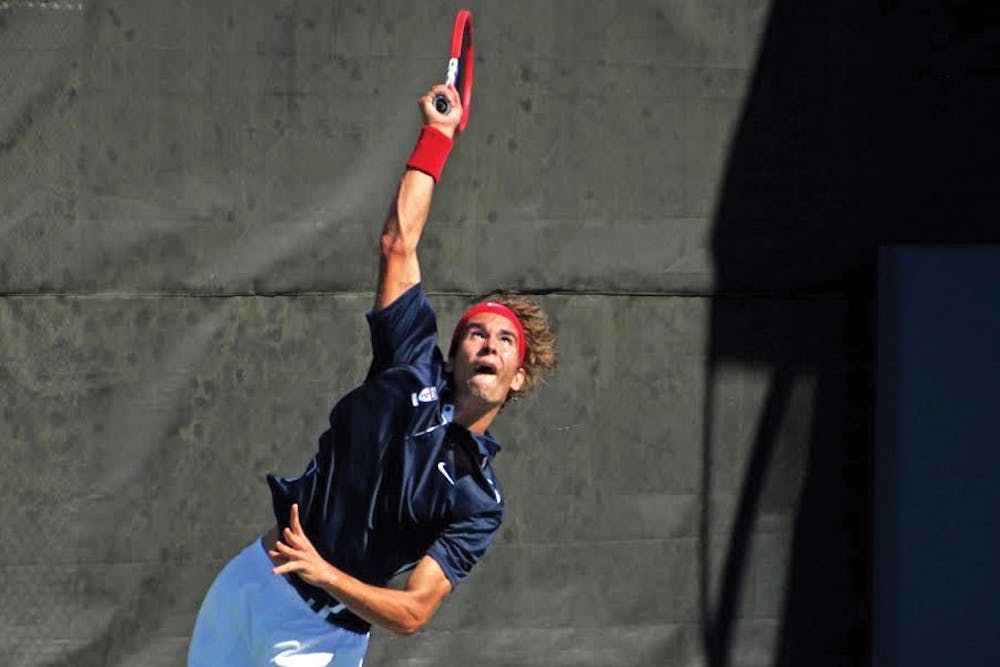
Penn men's tennis will need to continue without the services of freshman sensation Nick Podesta, adding uncertainty to the program's future.
Credit: Courtesy of Penn Athletics , Don FeliceOn March 21, Penn men’s tennis was prepared for matches against Temple and the joint team of Claremont-Mudd-Scripps. Despite two tough losses over spring break, the Quakers were in the midst of one of the best starts to their season in school history, sitting at 12-3 through 15 contests. Each of those losses came without their best player, freshman Nicolas Podesta. The team was far from concerned.
With everyone back and healthy for that Saturday doubleheader, the Quakers easily dispatched of Temple and the trio of Claremont colleges. The team improved to 14-3 on the year, and Podesta remained undefeated, perfect through his first eight matches at Penn. The team had high expectations going into the start of Ivy League play.
Things did not go according to plan.
Penn proceeded to drop both of its first two Ancient Eight contests against Princeton and Yale. Podesta also suffered his first two defeats.
The day after the Yale match, Penn fell again, this time to Brown. The Quakers’ young leader was not in the lineup and has not returned since.
It’s strange for any player — especially a team’s No. 1 singles player — to stop competing in the middle of the season without a reason. Early murmurs were that Podesta was injured or sick. He had missed the two spring break matches due to what head coach David Geatz called a “viral illness.”
It was later rumored that Podesta — a five-star recruit from Rumson, N.J. — was going to turn his focus to playing professional tennis. Geatz confirmed this earlier this week.
“He thinks his options are better to train with his private coaches,” said Geatz. “He wants to get out on the pro circuit, and he has some unbelievable opportunities to train with guys like Novak Djokovic and John McEnroe.
“It’s been his dream since he was 12 years old to go out there and play pro.”
Looking at Podesta’s body of work before college and during his short tenure on the Penn team, there is no doubt he is a tremendous talent.
In high school, Podesta was the top-ranked player in the Eastern section of the United States Tennis Association, won four junior national championships and was, at one point, the top recruit in the country. He also dipped his toes into the waters of professional tennis, playing several Futures events, the tennis equivalent of baseball’s minor leagues. Despite his winning record at this level, his peak world ranking was only 1,570 before arriving at Penn.
Although his abilities on the court are unquestionable, there may be another side to Podesta’s departure from the team.
Multiple sources close to and with knowledge of the situation claim that the rookie was kicked off the team after disputes with fellow players and coaches. Neither Geatz nor Podesta responded to questions of whether the latter was dismissed from the team.
No matter the reason for Podesta’s departure, his absence has hurt the Quakers as they have moved forward. With junior Vim de Alwis — Penn’s second-best singles player — out for the year with a torn meniscus, the Red and Blue had to rely on myriad individuals lower in the lineup to take on their opponents’ higher-seeded players.
Already since his exit, the Red and Blue have dropped six straight, going winless since that doubleheader on March 21. Through five Ivy matches, the Quakers are winless in Ivy League play with tough competitions against top-50 ranked schools Columbia and Cornell still left to finish out the season this weekend.
The loss of Podesta changes the entire outlook for the men’s tennis program.
“He’s maybe one of the best players to come to Penn tennis,” Geatz said. “Losing him is a huge loss for our team and will have a giant effect on our program.”
With the Quakers’ nucleus of young talent and a strong recruiting class set to arrive on campus next year, the team can still be successful without Podesta moving forward. However, it can’t be easy for a program to move on from a player who brought with him as much promise as Podesta did through the first half of this season.
The Daily Pennsylvanian is an independent, student-run newspaper. Please consider making a donation to support the coverage that shapes the University. Your generosity ensures a future of strong journalism at Penn.
DonatePlease note All comments are eligible for publication in The Daily Pennsylvanian.





